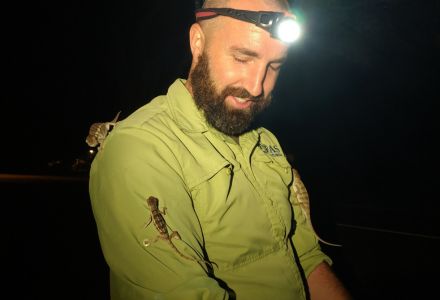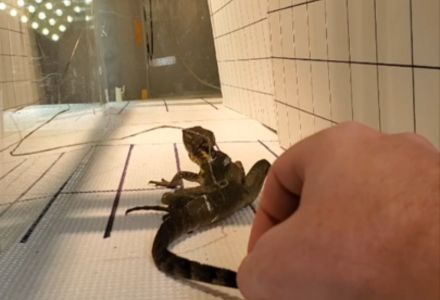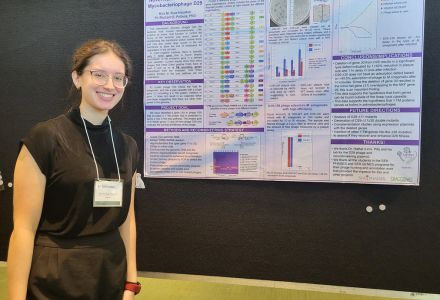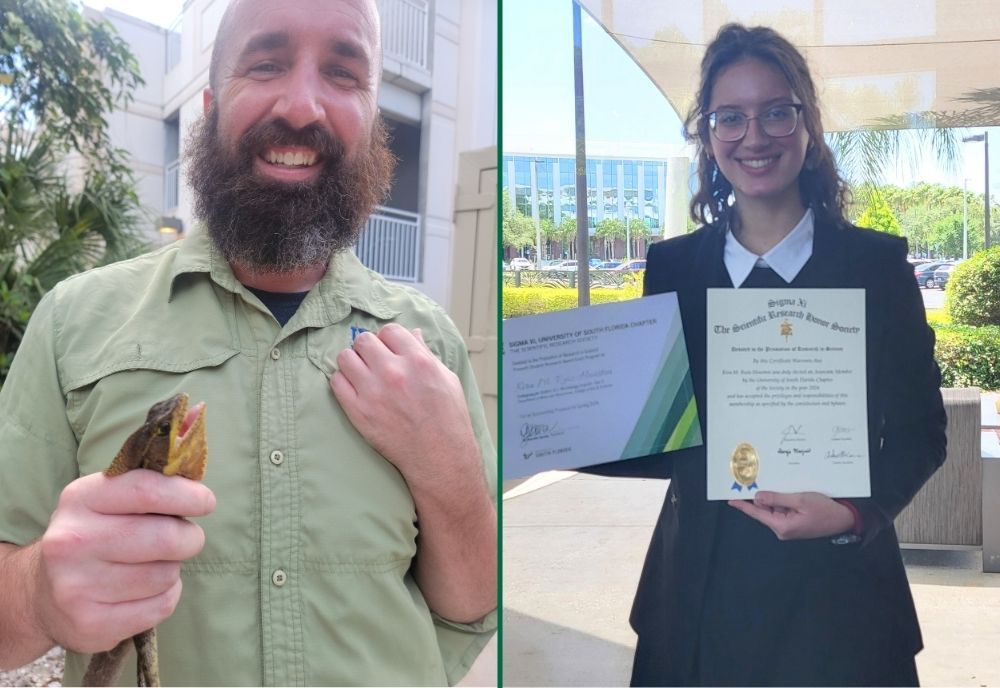Two students from the USF College of Arts and Sciences were recently awarded student research grants from the Sigma Xi USF chapter. Colin Goodman received the graduate award ($700), and Kira Ruiz-Houston received the undergraduate award ($300).
These awards will fund scientific investigation in any field, with fundable expenses related to equipment purchases, travel to and from a research site, supplies specific to the proposed project not generally available in an institutional research lab, travel to a scientific meeting or symposia, and manuscript preparation and publication costs.
Dr. Aurélie Germa, who served as Sigma Xi USF chapter president from 2022-2024, said the idea for offering student grants came during a meeting among the Sigma Xi USF chapter officers in the fall of 2022.
“The former president, Dr. Bogdan Onac, and I were brainstorming about how to increase student participation in our chapter and how we could offer direct benefits of being a member. Until now, Sigma Xi student members could apply for Grants in Aid of Research presented by the national society. We wanted to provide direct support for research to our undergraduate and graduate students,” Germa said.
She explained that the objective of the program was threefold, 1) creating direct benefits by being a member of the USF chapter, which includes supporting them through their education and path to graduation, 2) creating grant writing opportunities, which serve as the basis for investigation structure, and 3) bolstering a student’s CV/resume with an internationally recognized award.
During the application process, each student was asked to submit a narrative that details the proposed investigation in their respective research area. They were also asked to describe methods clearly and show how they are to be used to address the broader research question.
Goodman, a PhD candidate in the Department of Integrative Biology, focused his proposal on “Muscles, Motor Patterns, and Movement: What Explains Interspecific Variation in Thermal Performance Curves?”, which hinge on two hypotheses, 1) that differences in thermal sensitivity are explained by motor pattern heterogeneity, and 2) that differences in thermal sensitivity are explained by muscle contractile heterogeneity.

PhD candidate Colin Goodman. (Photo courtesy of Colin Goodman)

Lizard on the trackway during an experiment testing locomotion. (Photo courtesy of Colin Goodman)
“Broadly, I am interested in how temperature impacts movement in ectotherms. Because ectotherms rely on the environment to regulate their temperature, and because the biochemical processes that underlay muscle-powered movement are sensitive to changes in temperature, we would expect movement to be temperature-sensitive as well. Yet, despite this, the extent to which movement is temperature sensitive varies considerably among even closely related species. Thus, my research seeks to determine why there exists variation among species in thermal sensitivity,” Goodman said. “To do so, I use high-speed imagery and electromyography to measure limb movements and muscle activity in different lizard species during locomotion.”
Goodman said that the research grant will allow him to purchase the supplies necessary to conduct the experiments outlined in his proposal.
“Much of what the lab I am in focuses on is feeding small salamander species. To capture these feeding events, one requires lenses that can get close-up shots with a very narrow field of view. My research, however, involves imaging lizards sprinting along a trackway, thus requiring lenses with a very wide field of view. As a result of this grant, I have been able to purchase lenses that make my research possible.”
He shared that under his current proposal, he hopes to determine how temperature impacts locomotion at different levels of biological organization.
“From the whole organism, to limb coordination, to isolated muscle, my research seeks to determine how causes at different levels explain heterogeneity among species in thermal sensitivity,” he explained. “This grant will allow me to complete my dissertation research without having to use my own TA salary. I am incredibly grateful to Sigma Xi for this opportunity.”
Ruiz-Houston, who is pursuing a bachelor’s in microbiology from the Department of Molecular Biosciences, a minor in infection control, and a minor in general public health, focused her proposal on “Functional Analysis of Novel Holin Proteins in Mycobacteria Phage D29.”

Kira Ruiz-Houston presents her research during USF conference. (Photo courtesy of Kira Ruiz-Houston)
“Bacteriophages (phages) are viruses that infect bacteria. Due to the increasing threat of antimicrobial resistance, there is renewed interest in phages as agents to combat antibiotic-resistant strains,” Ruiz-Houston explained. “Since the endpoint of all phage applications is cell death, it is critical to better understand the lysis mechanism as it may help in choosing phages for an application or engineering them to lyse better.”
“This project was what I explored for my undergraduate honors thesis. With this proposal, we hope to further explore the unique lysis cassette organization within the A2 cluster phage D29 and evaluate the survival and fitness of the phage after performing bacteriophage recombineering. At the completion of this project, we will publish our findings in a high-impact journal,” she said.
“This grant program helps to promote scientific excellence and achievement for students, and it is a tremendous honor to receive a grant award from this honor society. I am very grateful to have been considered for this award, and to my PI Dr. Pollenz, for the opportunity to work with him on this project.”
Open to all USF students, two other individuals representing the College of Engineering were also awarded grants:
Graduate Recipient - Spring 2024
Fernanda Silva Pimenta, PhD student, Department of Chemical, Biological and Materials Engineering. “Landfill Gas to Produce Liquid Fuels and Chemicals using an Eggshell Catalyst.”
Undergraduate Recipient - Spring 2024
Daniela Zamora Alviarez, BS Mechanical Engineering. “Characterization of Graphene Monolayer and Bilayers for Electrocatalysis.”
If you are interested in applying for a Sigma Xi student research grant, application deadlines are October 15 and March 8.
